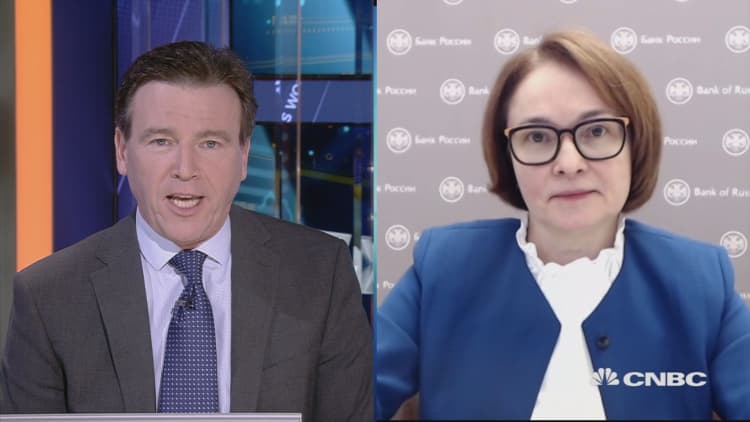
Russia's monetary policy decision-makers are preparing for continued uncertainty and a new wave of coronavirus cases sweeping much of the world, urging caution even as its central bank says there is some wiggle room for further interest rate reductions.
"We see some room for the reduction. It is limited, it's not so much as it was before, but we will decide how and when to use this room according to incoming data," Russian central bank chief Elvira Nabiullina told CNBC's Geoff Cutmore on Wednesday, referring to the country's interest rates.
In both its September and October meetings, Russia's central bank chose to keep its key rate steady at 4.25%, a total reduction of 350 basis points since June of the previous year. Nabiullina's emphasis was on being cautious, she said.
"We made a pause in September and October, assessing the short-term inflationary risks and some risks related to financial stability, the market, that's why we think we should be more careful about the development of the situation with the pandemic, with geopolitical issues and other issues."

Nabiullina still considers the bias in interest rates to be to the downside, even if she is being cautious, "because the Covid escalation in autumn increases the disinflationary risks, and the risks for the demand, and we see that in medium-term perspective the disinflationary risks will prevail, of course," she said.
"And we think that our policy will remain ... through the end of next year. We think that instead of decisions of cutting rates that we have made before, it will last through the end of this year at least."
Nabiullina said recovery for Russia's economy in the third quarter was "very dynamic" and led by domestic goods consumption, but the resurgence of coronavirus cases in much of the world has forced the country to revise down its forecast for consumer and investor demand. A key part of that lies in demand for one of Russia's most lucrative exports, oil, which saw a historic drop this spring and is still trading at more than 30% below pre-pandemic levels due to weak demand.
"The autumn Covid-19 escalation has led to some slowdown in the recovery, and that is why we revised our forecast for this year only plus half a percentage point, and we expect this year the economy will contract by between 4[%] and 5%," Nabiullina said. That figure is still not as bad as that of the World Bank, which says that Russia's economy could contract by 6% for 2020.
"We brought down our forecast for the next year, we think the growth will be between 3[%] and 4% and will be led by the internal consumption," she said.
The World Bank in its June outlook for Russia also pointed to household consumption as being expected to lead the recovery. Still, it highlighted risks that Nabiullina stressed on Wednesday concerning not only the pandemic but geopolitical uncertainty and its impact on oil prices.
The World Bank forecasts that even with potential positive growth, gross domestic product levels in 2022 will still struggle to match pre-pandemic levels.
Russia has the fourth-highest number of reported coronavirus cases in the world, at 1,553,028, and 26,752 deaths. In August it announced itself as the first country to have registered and gained government regulatory approval for its coronavirus vaccine, which is currently in late-stage testing.


